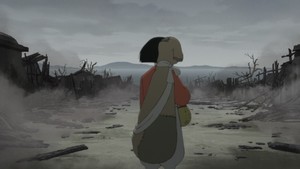
[ad_1]

I must have taken five or six different screencaps during this episode, torn between which was the most beautiful, the most symbolic, the best to use. In the end I settled on the first, from the very start of the episode: Biwa standing in the ruins of a burnt-out Fukuhara. It’s stark, and that, more than any other image of the episode, captures the reality of life for the Heike.
With the deaths of the previous episode weighing on them, along with their steadfast (and likely foolish) refusal to return the Sacred Treasures to cloistered emperor Go-Shirakawa, the Heike, who were already sinking, may as well have tied an anchor to their collective ankle. The death of Kiyomori was probably the major blow to them, although the loss of Shigemori certainly didn’t help – in fact, we might even say that Shigemori’s death pushed Kiyomori into a demented madness that the rest of his family is now unable to push aside. With the loss of Atsumori and Kiyotsune last week serving as foreshadowing, this week we lose Koremori as well, although if we’re being honest, I’d say that Koremori has been lost for a very long time – it’s just that nobody else realized it. But he’s known all along that he’s no warrior and the only reason he survived the most recent battle is because he wasn’t there. But as far as Koremori is concerned, he doesn’t feel like he’s been anywhere since his grandfather’s ambitions spiraled out of control. Even taking vows isn’t enough for him to feel at ease; he’s broken emotionally and despondent in ways possibly only Kiyotsune could have understood. That makes for a nice, albeit sad, parallel between the brothers, with both of them stepping off a boat into the sea. But what makes this work even more is the ways in which their deaths differ – yes, both drowned themselves, but Kiyotsune made a very deliberate, conscious decision to go. Like Tennyson’s Lady of Shallot, “singing in [his] song [he] died,” playing the flute before dropping it and then leaving the boat behind. Koremori, on the other hand, is shown as perhaps not being as aware of his world and surroundings as he finally finds peace. When he steps from the bow of the vessel, there’s no distinction between the sea and the sky. He might be descending to the depth or ascending to the heights, depending on how you feel about his decision. It’s deliberately unclear, because while Koremori is taking the easy way out, he’s also doing the one thing that he feels will bring him peace. Is he in his right mind? That’s perhaps not for us – or even him – to say.
What Sukemori thinks of this as the one surviving son of Shigemori is also unclear. He definitely mourns his brother’s death and knows that it was the war that killed him as surely as if he’d been struck down by an arrow. But whether he understands on an emotional level isn’t stated, and to be fair, emotional honesty has never been one of Sukemori’s strong suits. We see this again in his reaction to Biwa’s return to the Heike clan; he’s on one level glad to see the person who is, for all intents and purposes, his one remaining sibling. But he’s also aghast that his attempt to save her by driving her off has failed, because it’s clear to anyone whose eyes aren’t clouded with war that the end is very, very near. Biwa’s words to him, that she will record the story she has seen with her own eyes, offer only marginal comfort, because again, that means that the tale of the Heike is coming to its close.
The role of the storyteller comes when the story is over. As Biwa’s blind eyes continue to see the past even when it’s long gone, she invites us to visit it with her.
Rating:
The Heike Story is currently streaming on
Funimation.
[ad_2]





